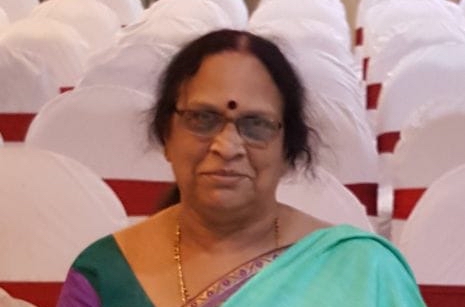Potturi Vijayalakshmi (1953-), born in Guntur district, Andhra Pradesh, has written 250 short stories and 14 novels in Telugu language. Premalekha, her first novel, was made into a successful movie. Widely published in Telugu dailies, and known for her humorous short stories, her works include Hasya Kathalu, Chandrahaaram, Maa Inti Ramayanam, Aanandame Andam. An acclaimed writer, she has been awarded Telugu University Trust Award (2007), Sri Krishna Mohan Rao Memorial Award (2007), SeshaaRatnam Memorial Award (2009), Gruha Lakshmi Swarna Mananam (2012), Apuroopa haasya prasaaram (2015), Munimaanikyam Haasya puraskaaram (2015), Delhi Telugu academy Udyog Bhaarat Puraskaar (2017).
Having completed his morning walk, Rāghava Rao came back home whistling jubilantly. Maithili, his wife, busy mixing coffee, felt a thud in her heart. ‘I’m done for the day; he is so jubilant. I’m done,’ she thought to herself.
She has a reason to be unhappy. Rāghava Rao had retired from the government service a couple of years ago. He owned a house. Both his children were in America. Everything was perfectly alright, and they were without any financial problems. His health was good too. But his only problem was how to kill time. Not that he wouldn’t get a job, if tried. But he didn’t like to work. He believed that if everybody worked after retirement, unemployment will be on the rise. Hence he would look for newer ways of passing time. For few years, he took every opportunity to undertake tours. He visited all the possible pilgrimages he could.
‘Right now there are no more plans of tours with us; if any, we would first inform you,’ declared tour organizers helplessly. Ever since, his condition became indescribable. Having subscribed for newspapers, he would read half a dozen dailies; watch all the news in TV. He would watch the TV for all kinds of sports played by sundry players in any nook and corner of the world. Thus he would pass time. But what he lacked was to show his authority on someone.
There used to be so many people at his command when he was in service. He got used to getting all the work done by commanding others. After his retirement, he lost that opportunity too. Yet he commanded the servant maid, ‘If you are careless about the work, I will suspend you from the job.’ Far from getting scared, ‘Don’t I get work elsewhere if you don’t want me to work!’ the maid, who was sweeping the floor, threw away the broom, and left.
After suspending a couple of maids, it was his wife’s turn to rebel, ‘As you keep sending away the maids by showing your authority on them, I am doomed to attend to the drudgery. I haven’t been able to work. If you don’t change yourself, I will leave for Kashi, the final pilgrimage,’ she declared. Having been terrified, he stopped meddling with the maids.
But old habits seldom die! It was then the turn of the grand lady of the house. She would love her husband so endearingly. She had so much of respect for him. His job had involved frequent transfers. ‘He never left me alone to look after the children in a city or town on the pretext of their education. Instead he used to say, “Wherever it is, let’s be together.” He took me along wherever he was transferred. He used to be home after the office hours, believing ‘Heaven is where home is,’ but he did never go round the clubs for parties. She used to say, “My husband is gold, to be frank.” Everything would be alright so long as it is fine. But it used to be a problem if at all something went wrong with him.
Usually he would return home quite irritatingly after completing his morning walk. He would get irritated saying to himself, ‘Chi chi! Who’s that good-for-nothing fellow on the road? Soon after a worker had swept the road, a woman over there emptied her dustbin. This country would never develop so long as this type of people are around,’ he was getting irritated. It was no problem to his wife if he angered like this about others. He would cool down on offering hot cup of coffee. But what was problematic to her was if only he came home whistling. He would whistle if he came across in the morning walk something that he thinks well. That is precisely the shears on her.
A few days ago he brought home a few sprouts and a pamphlet that explained the advantages of eating sprouts. Having taken me to task, he said, ‘Instead of eating the good-for-nothing dosa and oily stuff, start eating these sprouts. It’s good for health,’ he said.
‘Then what about you?’ she asked.
‘Me? But for pressure (hypertension) and sugar (diabetes), I am sturdy like a calf. Alas it’s you who needs it! Because you suffer from back ache and leg pulling.’ He made her eat sprouts for four days. She wanted to protest against her husband, ‘No! I can’t. Am I a horse to eat them?’
The following morning he came home without sprouts in the hand. But he entered the house whistling! He was holding in his hand a pamphlet that was about the advantages of prānāyāma, breathing exercise.
‘Here, you! Are you aware of this? It looks there is no need to regulate food if one practiced prānāyāma.’ He spread a mat in the centre of the house, and made her sit on the mat. He asked her to close one of her nostrils and inhale. He demonstrated to her how to do so.
Meanwhile when someone rang the calling bell, he left to know who it was. He returned after dealing with the visitor. By then she was found sitting in stretched out legs.
‘What happened? Did you breathe out?’ he asked her.
She got extremely irritated. ‘What a great idea! Having asked me to breathe in, you left to show your authority on someone else. Wouldn’t I breathe my last if I remain holding my breath till you came back?’ she said vexingly.
‘No no! You should’ve breathed out steadily!’ Prānāyāma lasted thus for about four days.
What was good about him was that whatever be the task he undertook, he would give it up tiresomely in about four days. The lady of the house was thus saved. ‘Why the hell he might’ve come whistling now?’ thinking to herself, Maithili approached him with a cup of coffee.
‘I must tell you about an important matter. Fetch a cup of coffee for yourself too and be seated here,’ Rāghava Rao asked his wife. She did so. He then began to narrate, ‘After the morning walk, I sat in the park to relax for some time. A couple sat beside me. They seemed as though they were the earliest couple descended straight from the heaven. I joined word with them. I understood from their talk that they have been jointly writing stories for years together. They are getting fame and money coupled with plenty of time pass.’ He seemed to be salivated while telling her about their lives. He concluded, ‘I came to a decision after meeting them.’
‘What’s it about? Shall we invite them for lunch?’ she found out.
‘No! Let’s write stories like them.’
‘Great! How does it sound to do something just because someone else had done it? How can we write stories?’ asked Maithili.
‘No no! We both have some experience in writing,’ he said. Their writing experience was that he had written an article for the college magazine forty years ago. She had written a letter to the editor twenty five years ago. That’s their experience in writing.
She would say that they can’t afford to write. ‘That can’t be so,’ he would say. As they indulged in such an argument, there appeared an advertisement in one of the weeklies. It was a competition of writing love stories. Attractive prizes too. The organizers advertised it in such a way that it would inspire not only the experienced writers but also those who were not into it. The advertisement seemed auspicious at a time when they were thinking of writing. To add to that, his right eye quivered indicating positive sign. She couldn’t have her say. A great mission had thus been inaugurated.
There needed for the story a hero and a heroine as it was a love story. They decided on having the names, Jayanth and Jaya for their proposed story. Then, a story was required. They pondered about it for a day. ‘How long shall we go on thinking? Let’s make a beginning,’ Rāghava Rao continued, ‘So that we can weave a story.’ He gave an opportunity first to his wife true to the convention of ‘ladies first.’
“The sun rose in the east,” she began to tell.
‘If not, where does it rise then? The sun anyway rises in the east. Do you have to say that specifically,’ he got irritated.
‘What’s this? When it comes to a story, there has to be a description of nature. What do you know about it? Even when you had written a letter to the wife, you wrote it as though it were an official letter. It requires a little bit of imagination,’ she too got irritated.
‘Oh! I too have a little bit of imagination. But the organizers fixed a limit of ten pages for the story. Then when would the actual story begin if you go on writing about the rise of the sun in the east, and setting in the west. It doesn’t require description.’
‘I just wanted to write a few words artistically. Don’t I have that freedom? I’ll then start the story,’ she said.
“Having entered the verandah, Jayanth flexed his muscles. His thick black puff of hair fell on his forehead at the wind that was blowing strongly.”
‘That’s enough; will you stop! You will wait in the wings for a chance to mock at me. You don’t have to ridicule me. I too used to have very thick hair. Being unable to put up with you, look, this is the fate of it!’ he said emotionally, tidying the leftover hair on his scalp.
‘This is too much. I am describing a character in the story. Am I not keeping silent when you compliment the neighboring lady, Maithri Majumdār as a slim woman resembling a creeper!’ she got ready to quarrel. The story didn’t progress for the day.
They got ready to write the story the following day. Being reminded of the ruckus of the previous day, Maithili weaved the story carefully. “Having awake early in the morning, Jayanth had his medicine. Entering into the kitchen, “Jaya, my darling! I have taken medicine for sugar. After half an hour, I must take medicine for pressure, and then go to the dentist,’ he informed his wife,” she began the story thus.
‘Given a chance, you would always mock me. These days you are ridiculing me. If it’s not to tease me, why do you describe Jayanth, a young man, to be suffering from sugar and pressure? To add to that, he visits a dentist too!’ Rāghava Rao rebuked his wife.
‘You would find fault with whatever I write. Am I clamoring for writing? I can’t write,’ she said. As the matter went out of control, he pleaded with her. She consented. But she came up with a condition that they both should write the story in one’s own way.
‘In that case, won’t there be two ways?’ he continued, ‘Then let’s both write five sentences each alternatively. Even if one doesn’t like the other’s writing, one must criticize gently, but shouldn’t rebuke each other.’ Thus they set a million and half conditions to each other.
They began the story again. Maithili started, “Jaya put on a diamond necklace in her neck. Jayanth loved his wife so much. He wouldn’t get vexed, ‘Why do you need ornaments?’ Instead he would buy her ornaments saying, ‘What else do I need, other than your happiness, Jaya!’ Not only that. He would compliment her, ‘If you wore an ornament, it would look beautiful because of your looks,’” she completed her turn of five sentences.
Rāghava Rao got irritated. But having been reminded of the conditions, he was resilient, ‘Is it not enough to say that Jaya sported her necklace? What’s so great if a husband appreciated his wife? Any husband would appreciate one’s wife,’ he said disappointingly.
‘Anyway, there can be a husband who would masquerade to be reading a news paper instead of paying attention to one’s wife who’s in a new sari wandering in front of him,’ said Maithili.
Controlling his anger, Rāghava Rao took his turn to continue the story, ‘Jaya served breakfast to her husband, instead of wandering here and there having made up herself. She served him soft cotton-like idlies for breakfast savoring them with dainty ghee. She served warm sāmbār, ginger pickle, coconut chutney and chilly powder. She went into the kitchen to bring a roast dosa stuffing cashews inside…’
She interrupted him, ‘It’s enough, and you may stop now. You are done with your turn of five sentences. There is no scope for coffee,’ she reminded him about the condition they had set.
‘Have I completed five sentences already,’ he got disappointed.
‘Let me ask one thing; is she by any chance, running a hotel to make all these preparations for breakfast?’ asked Maithili.
‘One need not have to run a hotel. There are women who do not serve routine recipes. There are devoted women who cook and serve their husbands what they relished most,’ he said.
Her turn began again. “Jayanth didn’t leave having eaten to the brim. Instead he said, ‘Jaya, my! You too should eat now,’ so saying, he even fed her.”
Meanwhile a sari vendor had arrived. ‘Ammagāru, Madam! Do you want to buy saris?’ he asked. Yet Maithili tried to continue writing her story.
‘You may stop it now. Your turn of five sentences is over. The sari vendor would come once a month like Lord Yama, to rob me of my money. Does he have to visit to sell his saris even while writing a story to,’ he intervened.
“I don’t need any more saris. There are ever so many saris in the house. Anyway, it’s a big waste of money to buy saris. Instead it’s better to invest in mutual fund, in turn one would get dividend,’ said Jaya as she was a clever house wife.” He concluded his turn of five sentences.
They both wrote the story the same way at one stretch. They could write twenty pages, and reduce it to ten pages wrestling and struggling. The story read fine though there weren’t any romantic scenes and amorous acts in the parks. They dispatched the story to the competition.
First published in 2006
Translated by K. Purushotham from the original Telugu, “Aunu – Vālliddarü katha rāsāru”









Add comment